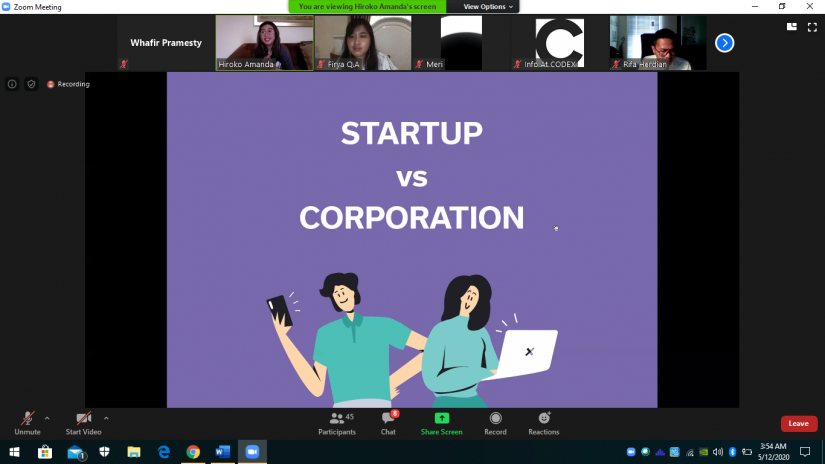
Yogyakarta, May 12th, 2020– Center for Digital Society or CfDS Fisipol UGM held the Digitalk #40 program by collaborating with CODEX on Tuesday (5/12). The theme brought upon this occasion was “Digital Talent Preparation 101” presented by Hiroko Amanda, Chief of Employer Branding and Talent Management of CODEX powered by Telkom Indonesia. Through the Zoom Meeting Room and YouTube’s Live Broadcast Platform, the discussion started at 15.00 WIB moderated by Firya Qurratu’ain, CfDS Partnership Associate.
CODEX is a special team created under the Digital Services sector of Telkom Indonesia in charge of managing the Digital Talent Cycle. Under its authority of the recruitment process, CODEX opens opportunities for talents who are experts in the digital field to join Telkom Indonesia. In responding to the young people’s enthusiasm in the world of start-up work, the speaker tried to deeply explore the pleasure and challenges of working at start-up companies. When compared to corporations in general, working in start-up companies has flexibility in work time and place, besides that we can also more openly trial and error or wear a relaxed and supple fashion.
Start-up and corporation are two contradictory and worth to consider in matters of lifework decisions. Start-up is a company that is in the early stages of development established by one to three people who focus on employing perceived market demand by developing products, services of platforms. Whereas a corporation is a larger and more stable profit-producing company that have certain social and economic impacts.
Hiroko explained that both of them had very different characteristics. At start-up, they take big risks but with high achievements, more than just a regular work because the competitions are happening on a day-to-day basis. Even it is known that only 20% of start-ups are successful, small teams are formed, one spot, flat organizations who always have to innovate. While in corporation, emphasize more on profit over risk, regular jobs based on their respective roles, a large team, doing the same thing according to their fields and collecting very large funds.
“My advice is to never follow other people, maybe other people can succeed in their field, but not necessarily friends will succeed in the same field. Match what you like and feel comfortable with the company offers,” said Hiroko.
Before applying between start-up and corporation we also need to know their culture that potentially suit us. If the start-up works, it demands a fast-paced work due to its rapid growth, must be adaptive to every change, pro-active, often ask questions, self-research, confidence in giving ideas or opinions and must be ready to help other teams. At start-up, changes in position often occur as a result of rapid management change, will have the opportunity to experiment, very open to trial and error, and usually do not have an always stand-by leader, which we are required to be independent without a supervisor.
Unlike in corporation, we will have a manager to keep in touch or interfere, there is no trial and error, and the expert focuses on one thing, the work time is certain, more concerned with compensation than passion, clear salary and benefits, even usually get a bonus. “Start-ups provide more affection and a comfortable work environment to replace material things,” said Hiroko.
In the digital technology era 4.0, it is expected that in the next ten years many jobs will be replaced by robots. If these conditions occur, as humans we will try to adapt to these conditions by learning skills that robots can’t do. “The first is unpredictable physical activities where the machine can only do a fixed job with a certain amount of time, whereas there are jobs that can’t be predicted. For example, developers, designers who need creativity, innovation, where only the human brain can do. Then interacting with stakeholders that requires communication, social, and emotional skills that will be more considerate. Lastly, managing and developing people, jobs related to leadership will also be sought after,” explained Hiroko
Therefore, soft skills have higher demand in the workforce rather than hard skills. Based on The World Economic Forum, the most sought-after soft skills in the future are complex problem solving, emotional intelligence, critical thinking, judgement and decision making, leadership, service orientation, creativity, negotiation, people management, and cognitive flexibility. After the speakers finished the material, the discussion continued with a question and answer session. The discussion ended at 17.00 WIB.
